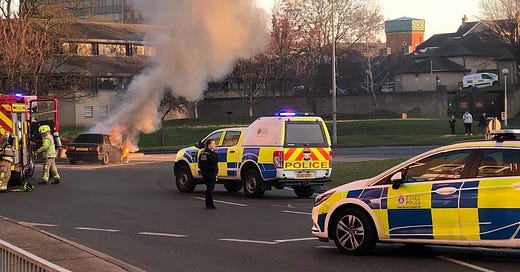In this episode, we explore how a certain set of dysfunctional traits can combine in dangerous ways, to place our entire world at risk
This one may be challenging for a lot of people, but it’s really important, and it needs to be said.
We’re in danger - all of us are in danger. Existential-level danger, in some cases. Yet the danger is from something entirely abstract: the way people think.
Or don’t think, rather.
Here’s a real example. Back about three years ago, I was walking down the last shopping-street in town, that leads to an underpass under a main road. I noticed the smell of something burning - a rather metallic smell, rather than just wood or paper. So rather than going straight through the underpass, I turned towards the smell. And there, at the junction of the two main roads through the town, I saw this car, fully ablaze:
No-one hurt, fortunately. The owner said he’d been on a test-drive after doing maintenance on the engine, and had inadvertently left something loose enough to cause a fuel leak. He’d had just enough time to pull over to the side and bail out before the flames fully took hold. All straightforward enough, then: just one of those things that happen.
Yet we now live in a world where some people will say that it didn’t happen - even though the incident is right in front of them. Or that the whole thing was a fake, that it was just staged by ‘crisis-actors’ in a deliberate plot to take away people’s right to maintain their own vehicles. Or that it was deliberately sabotaged by some arbitrarily-chosen political opponents or scapegoat-group. Or that was ‘God’s will’ and that this was God’s punishment for the driver’s presumed sinfulness. Or; or; or; none of which has any connection to reality.
Or there’ll be secondary issues or assertions, such as selectively showing only that cropped image above to claim that the police and fire-crews never turned up to help:
Or that they shouldn’t have turned up, because helping people like that was ‘socialism’, or at the least was a waste of taxpayer’s money. Or that the driver deserved extra punishment because he’d ‘deliberately’ caused a traffic-jam with the fire. And so on, and so on, and so on: no limit at all to these arbitrary, untested assumptions and prejudices…
We need a world in which a car on fire in the middle of the street is acknowledged as a real fact. We need a world in which there are real means to put out such fires, and to make sure that no-one else is put at risk. We need a world in which we can successfully clean up the resultant mess, and do what we can to make sure that it doesn’t happen again.
What we have instead, right now, is a world in which there is an increasing disconnect from reality; an increasing rejection of responsibility, in any sense of the word. It’s fast becoming a lethal brew that risks getting us all killed - along with the entirety of all life on this planet.
Not A Good Idea…
As I see it, this ‘lethal brew’ most often comprises a combination of various conceptual dysfunctions.
The first of these is a startling degree of wilful ignorance. At the most basic level, it starts with abysmally-inadequate education, but also coupled with and exacerbated by a strange absence of curiosity about the world. I’ve recently been reviewing the journal that I wrote about my motorcycle trip across the US and back in 1989, and a couple of examples of this come immediately to mind. One was a conversation with a pair of lads working on a roof somewhere in the mid-West: they asked me how long it had taken me to ride the bike from England - they literally did not know that there was an ocean in the way. Another was a lass somewhere further south, who said she was surprised that, as a foreigner, how easily I spoke English; I explained that I was from England, and that that was why it was called English, but she was still absolutely certain that English was invented by and only ever spoken by Americans.
These days, though, there seems to have been shift to a more literal 'ignore-ance': not just a passive absence of knowledge about the world, but more an active rejection of any fact that doesn't fit existing assumptions or prejudices. The sneering phrase “do your own research” doesn’t actually mean real research at all, but at best means something more like “do some random yet carefully-selective internet-searches for conspiracy-theories that will support my existing untested beliefs”. The result not only leads to circular-reasoning and poor decision-making, but also leaves those people wilfully wide-open to misinformation, disinformation, scams and worse. Not A Good Idea…
The next of these dysfunctions is what I’d have to call wilful cluelessness - not just a lack of critical-thinking, but more a systematic rejection of critical-thinking. There seems to be a partitioning of this, because people generally do seem to be able to apply at least some level of critical-thinking in their own immediate work-environments (though I’ve seen all too many examples of its absence even there…), but not able or willing to abstract that ability and apply it in other contexts. Yes, that falling level of education plays a part in this; and yes, as always, organised-religion is a key factor here, both as symptom and as cause - see my YouTube video ‘Religion is a private matter’ for more on that. Yet, more broadly, there seems to be an increasing absence of awareness of consequences of actions, especially over broader scopes and longer timescales; and worse, an increasing inability, unwillingness or even active rejection of any responsibility at all to 'connect the dots' across contexts. Not A Good Idea…
Exacerbating all of this is a swirling tide of wilful dishonesty - a systematic rejection of the importance of ‘telling the truth’. True, this is not exactly new, particularly in politics or business: for example, a personal experience of this, around a decade ago, when a large consultancy headhunted me to join their team. In the follow-up phone-interview, their lead consultant asked me if I would always tell the client the truth. “Yes, of course”, I said, “otherwise they wouldn’t be able to make good decisions”. There was a long moment of silence at the other end of the call, and then the line went dead. I never did hear from them again: apparently a willingness to lie for profit was a mandatory requirement in that organisation… So yes, the problem was bad enough back then; but in the past few years, particularly in politics, it’s reached the level of a global-scale pandemic, a relentless and seemingly-unstoppable tsunami of lies-upon-lies-upon-lies, in which actual truth has become an endangered species hunted down into near-oblivion. Not A Good Idea…
And making this worse again is another globally-increasing pandemic of addictive-irresponsibility - one of the most common symptoms of a rampant paediarchy, ‘rule by, for and on behalf of the most childish’. We’ll see this particularly as a lack of care, not just about others but about basically anything; and also an increasing dependence on lying and also on other-blame - "it's not my fault, so it must be theirs". Yet because this literally doesn't work, it also leads to spiralling violence, as each of the players attempts, with increasing desperation, to offload the work, the responsibility and the blame onto everyone else, whilst less and less actual work is done. Again, Not A Good Idea…
Each of these dysfunctions is problematic enough on its own: but the real danger is that when they combine, they create a lethal brew that could yet kill us all. We urgently need to be turning the tide on this, if we are to have any chance of facing the challenges and changes coming our way.





I would like to add one other, and that is " Addictive Disruption" with the ability of individuals or groups who disrupt any conversation in an attempt to gain visibility. Countless hours are wasted in ad-hoc discussions between the pro or anti disruption candidates whilst the original individual / group have moved on to their next target.
It would appear that these parties who indulge in this disruption gain a sordid pleasure in contributing to increasing levels of confusion amongst the members of a given conversation.
Very good point, Robert. I came across a similar problem in LinkedIn threads, which I described as 'specialism-trolls' - people who would drag every conversation to their specific chosen topic or theory, wrecking the point and purpose of the original discussion. Sometimes, yes, the motivation was a crude pleasure at disrupting-for-the-sake-of-disrupting, or just for ego-gratification, as you say. Yet there can be other motivations too: in the three examples I looked at, one had been a big-fish in what was now a rapidly shrinking puddle, and was desperate to maintain his sense of importance; one was focussed on dragging the conversation towards his training-courses; and the third was fixated on a classic 'one-solution-fits-all'. There's more detail on that in my old weblog posts at 'The dangers of specialism-trolls in enterprise architecture' http://weblog.tetradian.com/2014/12/12/specialism-trolls-and-ea/ and 'More on trolls, specialism and context' http://weblog.tetradian.com/2014/12/14/more-on-trolls-specialism-and-context/ .